A hopeful story of crossing party lines in Iowa
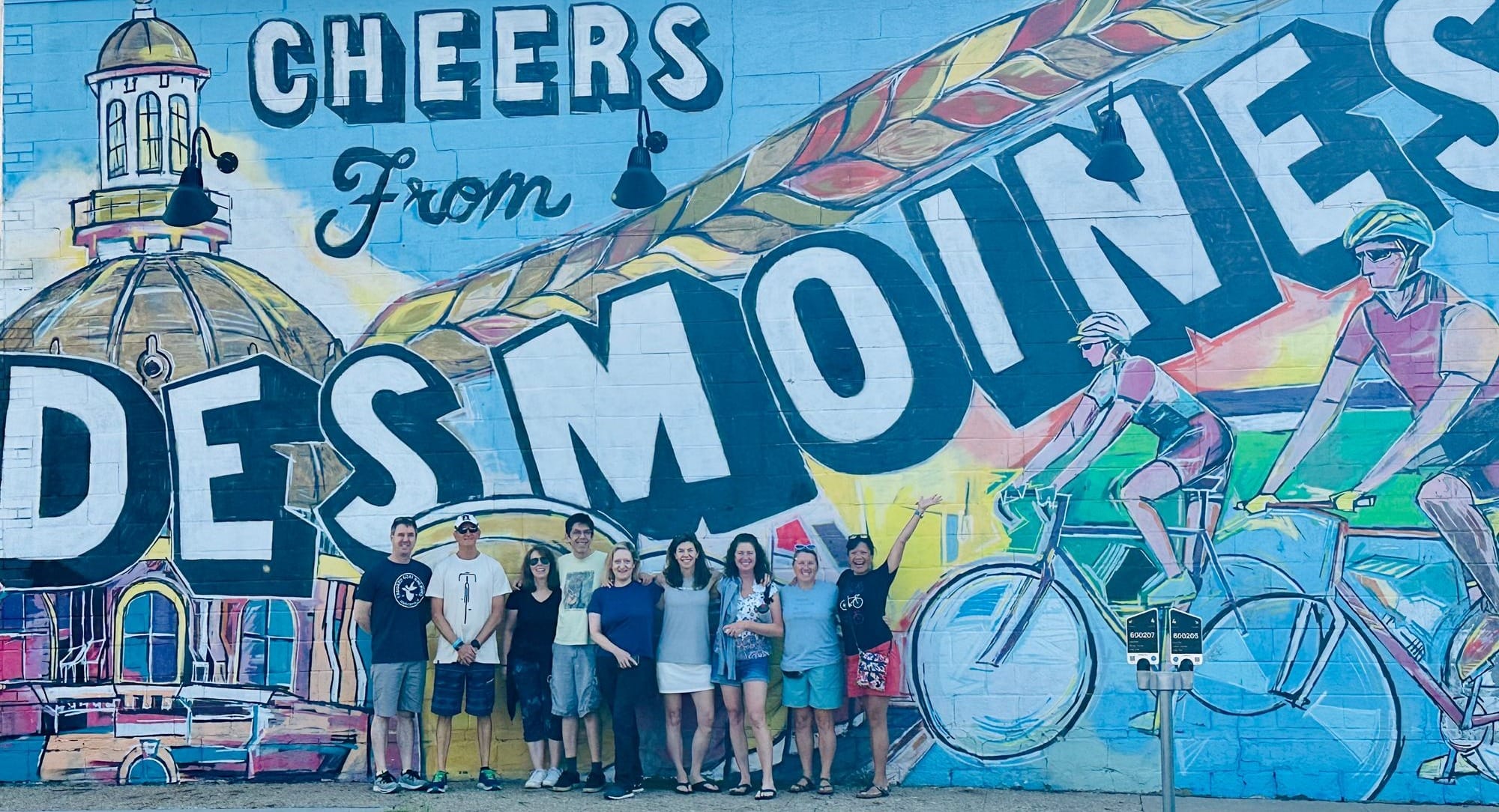
We were waiting to make the drive from Des Moines to Sioux City to start RAGBRAI, the seven-day bike ride across Iowa that I completed last July, when I met Prakash Kopparapu. His 16-year-old daughter Sami was about to board a bus to do the same ride with the Des Moines Dream Team, a nonprofit that trains local youth to complete RAGBRAI (Register's Annual Great Bicycle Ride Across Iowa) and build resilience and leadership skills along the way. Like our group, their team of 30 youth would be embarking the next day and were taking a photo against the mural pictured above. (That's some of our team, Team Legacy, doing the same).
Kudos are due to any kid who tackles such a feat, and to any parent who supports it. So we struck up a conversation.
I learned that it was his daughter's second RAGBRAI; she'd completed the first when she was 13! We shared more about our families and work; in addition to working at Wells Fargo, Kopparapu chairs the Asian American Pacific Islander Caucus for the Iowa Democratic Party and convenes candidate events for the local Indo American PAC-IA. He also texts with Vivek Ramaswamy and is quoted in articles like this one in the New York Times. I was intrigued.
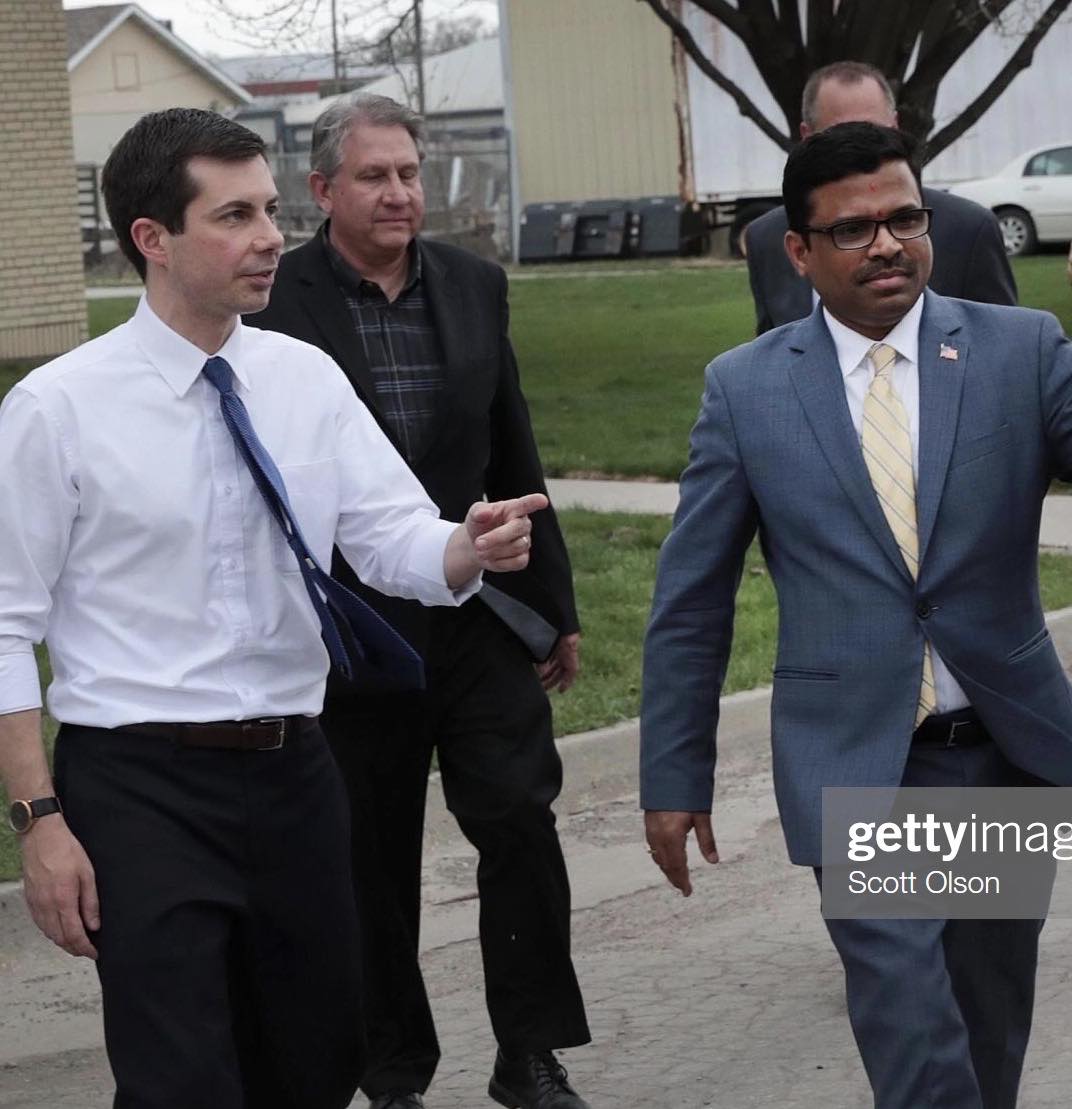
Kopparapu saw my Truth in Common t-shirt and asked what I do. (I'd printed a bunch for the trip to hand out to my team, for brand awareness and as a conversation starter. It worked!)
We're both connectors in our spheres and we had a lively discussion about the spread of disinformation. We even texted during the bike ride – I somehow ran across his daughter twice during the massive event and sent him a photo or two. We had a Zoom call to catch up after and have continued to chat since.
Meeting Kopparapu was a heartwarming way to start my Iowa experience. But this story isn't about our connection, or that Ramaswamy apparently is a skilled karaoke singer. As Kopparapu shared anecdotes it became clear how easily and intentionally he has meaningful conversations with people whose viewpoints are different from his own. These are the stories we need to hear.
Bridging the divide
Kopparapu talked about one relationship in particular – with a local school board member he'd befriended whom he described as leaning pretty far to the right.
I asked to interview them both about it, and they agreed.
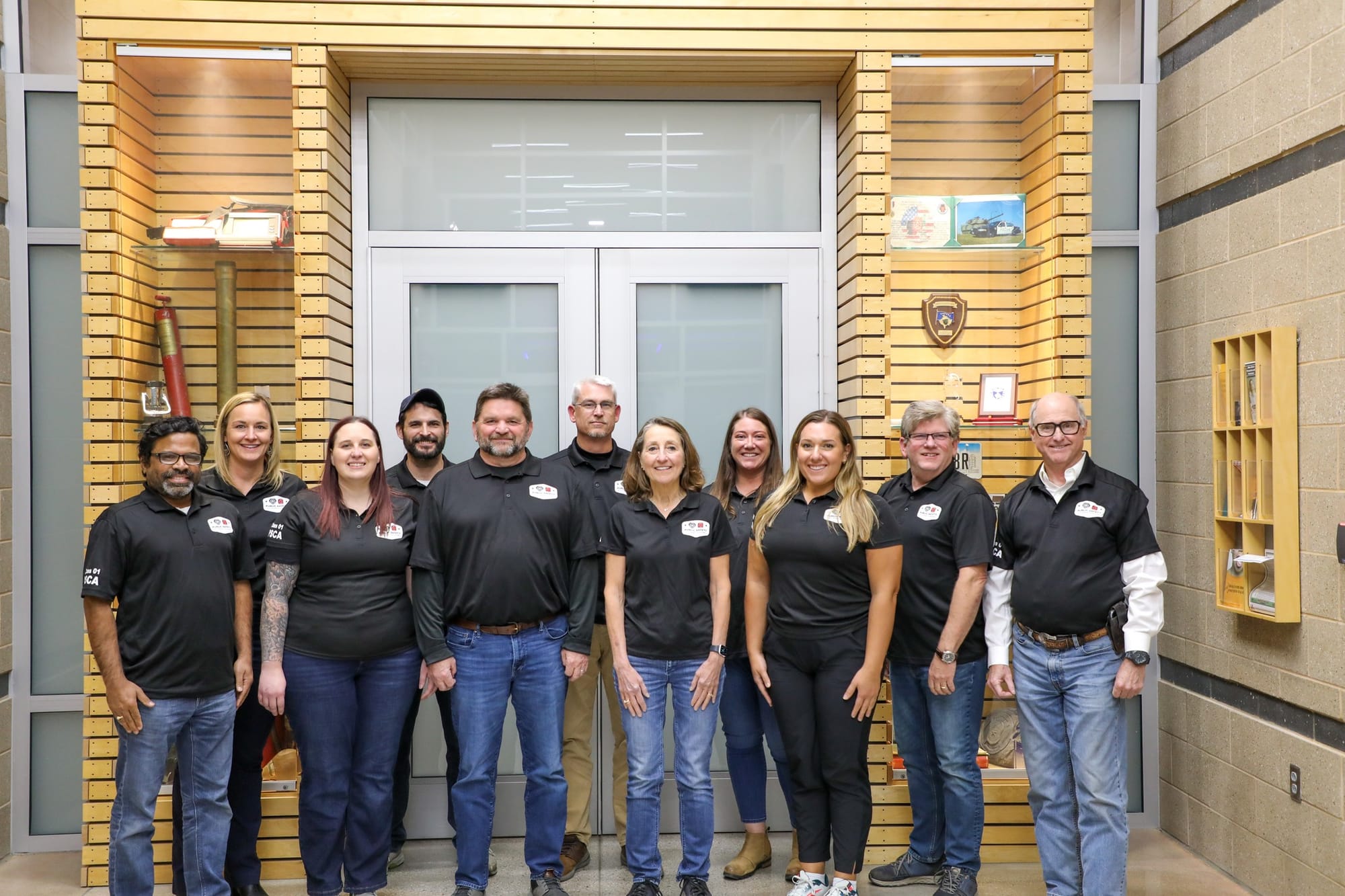
Class 1 of the Johnston-Grimes Metropolitan Fire Department and Johnston Police Department's Public Safety Citizens Academy (courtesy Derek Tidball)
Derek Tidball (above, fourth from left) was born and raised in Des Moines. He served in the U.S. Army for nine years, used the GI Bill to get a degree in public administration from Indiana University and now works in the real estate industry. He lives in the Des Moines suburb of Johnston with his wife and daughter and when we talked last fall, was mid-way through a four-year term on the Johnston Community School District board.
He met Kopparapu (above, far left) when they both served on the town's Public Safety Citizens Academy, an eight-week program in which residents learn from and advise local police and firefighters. "The only thing I'd heard about him was empty library shelves, calling Derek a Nazi, banning books," Kopparapu said.
Tidball was one of three candidates backed by the conservative education group 1776 Action who ran and won in 2021, unseating the then-school board chair and vice chair and filling a vacant spot. It was an upset election that generated significant media coverage at the time and has led to increased scrutiny, since.
When asked, Tidball was quite candid about these things, Kopparapu said, and did not seem to be the extremist that had been portrayed. The two began grabbing snacks together and chatting about their lives and the issues facing the school system.
They shared a commitment to community service. Neither sitting on the school board nor running political events are easy these days, especially for busy working parents. A single dad with special needs kids, Kopparapu still found time to volunteer on the School Improvement Advisory Committee (SAIC), which helps set academic and curriculum goals for the district, and has been appointed to commissions studying autism and Medicare.
Kopparapu sometimes was the only parent to show up for the SAIC meetings, Tidball said. "It was nice to have other people who want to help pull the oars."
During one chat Kopparapu raised the school board's controversial approval of a Johnston High School student's application to start a Turning Point USA club.
"I said hey, what was this about Turning Point, why did you vote them in?" Kopparapu said. Started by conservative commentator Charlie Kirk in 2012, Turning Point USA aims to "identify, educate, train and organize students to promote freedom," has clear political and religious agendas and has grown exponentially since the 2016 presidential election.
Parents had mixed, often heated views about the possible club. But Tidball told Kopparapu that he hadn't seen any particular threats to the community and that he'd looked into the people involved. They couldn't really block the organization without blocking others as well, and could disband the club if things went sideways. So he joined the majority in voting yes. "That made sense to me," Kopparapu said.
TPUSA was in 23 other Iowa districts at the time, but Johnston got much of the attention. Tidball felt the press coverage and rhetoric buried his and other decisionmakers' intents.
The friends also discussed a 2023 parental consent law that said that if a student asks to be called by a gender-affirming pronoun or name that's different from the school roster, their parent or caregiver must fill out a form to approve it. Kopparapu said his daughter came home from school asking why all her teachers were suddenly calling her Samita, when she'd always been known as Sami. The law can't be implemented, Kopparapu said. "I want to work on that."
On our call, we discussed the context. Schools had been surveying students about the pronouns and names they wanted used at school in a way that seemed to be shielding their preferences from parent scrutiny. It was up to individual districts to follow the letter of the new law, Tidball explained, so the board ruled that parents needed to disclose all alternate names or nicknames in their registration paperwork at the beginning of the year. "Prakash wasn't the only parent who called" to complain, he chuckled.
Iowa has a Republican legislature, many school districts and a variety of political leanings. "Some districts are doing malicious compliance – intentionally overcompensating so it's burdensome, and complete nonsense," Tidball said. "We're trying to be more reasonable." And, he hopes, focus on the intent of the law in making compliance decisions in the future.
The friendship between the two hasn't gone unnoticed. At one point someone screenshotted a Facebook exchange between them and used it to complain about Tidball being on the school board; since it was on Kopparapu's page he found himself along for the ride.
Undeterred, they continue to work together on issues that matter to families.
Building trust
This story shows that people with different viewpoints can engage civilly on policy issues. It's also an example of how trust is nurtured and sustained. In the friends' interactions, you can see the presence of authenticity, logic and empathy – the three elements necessary for any trusting relationship according to Harvard Business School's Frances Frei. These elements are especially critical when interacting in a polarized environment and with those whose viewpoints and backgrounds are different from your own. Building the relationship in person vs on Zoom helped as well, I bet.
Once established, trust pays it forward by preventing things from scaling up if differences of opinion arise. "When you have a disagreement, why not talk to the person?" Kopparapu said. "I implemented that and practice it every day."
Tidball acknowledged that the two probably wouldn't align much on national issues like abortion or January 6, but on the important stuff – community issues – they often did. And research reinforces that trust may be more easily built at the local level; local media outlets and decisionmakers, for example, are more trusted than national ones.
"Derek was kind enough to have a conversation."
Research teams that participated in the Strengthening Democracy Challenge, led by the Stanford Polarization and Social Change Lab in 2022, found that simply interacting with someone whose viewpoints are different from your own can help reduce what we call in-group/out-group thinking. Even watching that connection happen among others – for example, viewing the now-well-known Heineken commercial from 2017, Worlds Apart – can diminish partisan animosity. Stanford's Rob Willer, who helped lead the challenge, calls this "vicarious contact."
This Judy Woodruff piece, part of her America at a Crossroads series for PBS, covers the PASCL research in an engaging way and shows highlights from the commercial.
The bottom line . . .
" . . . is kids," Tidball said. "Prakash is one of the people I can have conversations with; there are no ulterior motives."
From Kopparapu: "What Derek is doing – seeing beyond the differences, focusing on benefit vs whining and complaining . . . that's what we need."
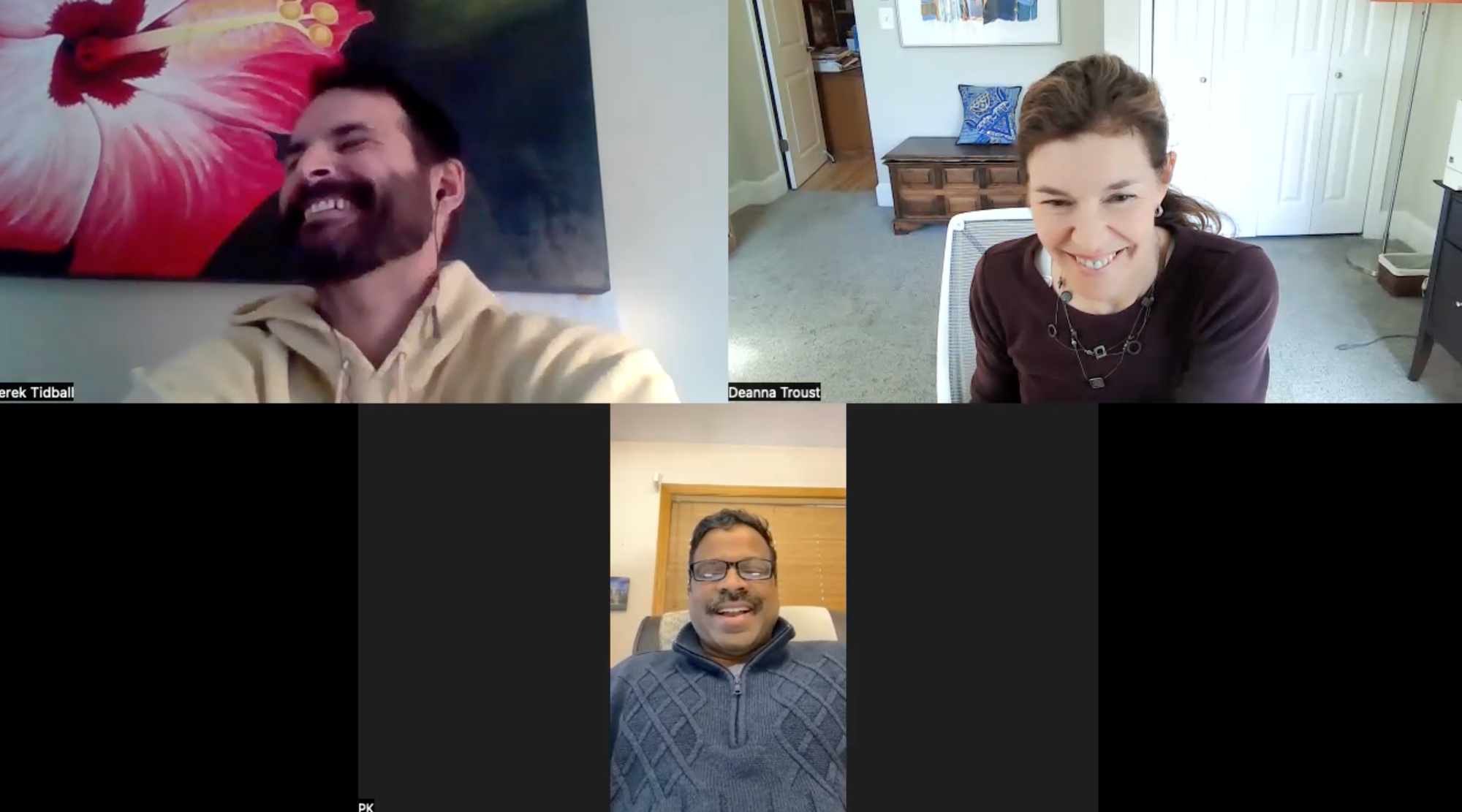
In other news
- Speaking of Iowa, here's the story of two former military guys and Meta employees who investigated a website full of garbled, AI-generated financial content that had co-opted and was using the dormant URL of a local news outlet, the Clayton County Register. Here's their report. (Wired, plus here are some ways to report a fake website)
- And this piece, about a reporter who was denied press credentials for covering the Iowa House of Representatives for five years. (Poynter)
DISINFORMATION & ELECTIONS:
- An investigation revealed the woman who original seeded the falsehood that there were more votes cast than there were voters in the 2020 presidential election in Pennsylvania, a claim repeated widely by former president Trump and others. The piece debunks the claim and shows the risk non-professional researchers can pose and how quickly these claims can take hold. (Vote Beat, via Spotlight PA and Philadelphia Inquirer)
- A Just Security analysis listed five factors that make the risk of disinformation in this year's election worse than in 2020, from emboldened domestic and foreign actors to reduced content moderation to AI's ability to mislead and suppress voter activity. (Just Security and Brennan Center for Justice).
- A New Orleans magician (!) has claimed that he created the audio deepfake robocalls that mimicked President Biden telling New Hampshire residents to not bother voting in the primary. He said he was hired by a consultant for Dean Phillips, a Minnesota congressman and challenger for the Democratic nomination, and that he used software that cost him $1. (Forbes)
SOCIAL MEDIA:
- Last week, the U.S. Supreme Court began hearing a case that challenges laws in Florida and Texas that restrict social media platforms' abilities to moderate content and claim the moderation stifles conservative viewpoints. (NBC News)
- My take: My go-to in situations like these is the Knight First Amendment Institute, which in an amicus brief urged the Court to invalidate both states’ provisions that prohibit social media platforms from removing or limiting the visibility of user content.
- Days prior, the Florida House pushed through a bill that would block anyone younger than 16 from creating accounts on some social media platforms. It requires a third-party age verification system as well. (Politico)
- My take: That parents will have zero say in these decisions if the bill passes is hypocritical in a state that's taken a stand for parents' rights; to me it suggests another agenda. Florida will also be sued on free speech grounds – Montana's attempted TikTok ban was blocked in Federal court; Utah is being sued by NetChoice for mandating that kids get parent permission to set up accounts and adhere to a 10:30 social media curfew, provisions that are supposed to start on March 1.
- The Threads community was reeling after Meta's decision that "political" content will no longer be recommended by the algorithm, with a definition of "political" so broad that it apparently will down-rank discourse on virtually any social issue. (Columbia Journalism Review)
- My take: With so much discourse taking place on social media, not being able to discuss the issues on this growing platform is an issue itself – especially during a high-stakes election year here and globally, with X bereft of experts, Reddit going public and fractured communities to boot.
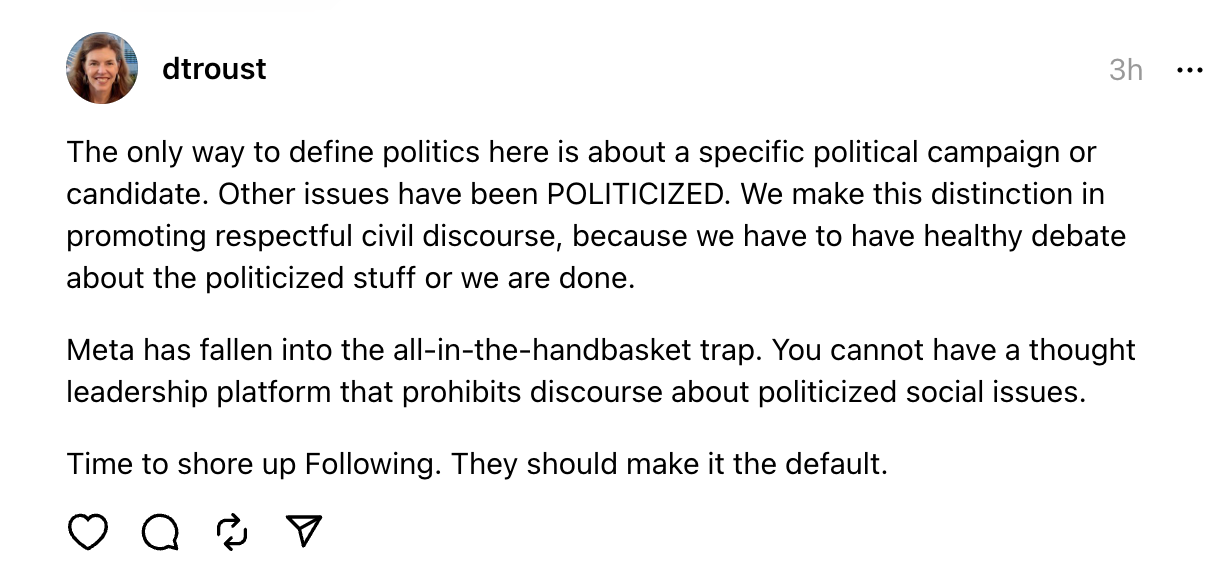
- I also find the absence of any sense that social media platforms have even a small obligation to the common good unacceptable, plus it's really stupid for their brands.
- This clear-headed, expert analysis of the national security risks posed by TikTok found that yes, the Chinese government can compel TikTok to share data or product details, but that while TikTok's data gathering is on the high end among platforms the volume is nominal compared to what the Chinese government accesses via data brokers and hacking. (DFRLab)
Truth in Common updates
We're moving our updates to another email stream, but if you like you can read this LinkedIn post about a talk I did at the Press Club in February with military and national security experts or access a webinar on disinformation that I led with a Bay Area League of Women Voters chapter in January. There's more to come as our strategic focus is on debunking election-related disinformation and doing whatever else we can do protect democracy this year.
As always, happy for your comments and feedback!
Deanna Troust is founder and president of Truth in Common and 3 Stories Communications. Visit www.truthincommon.org or follow Deanna on LinkedIn, Threads, Twitter, or Instagram.
